Iranian Nurses, Workers Protest Poor Living Condition
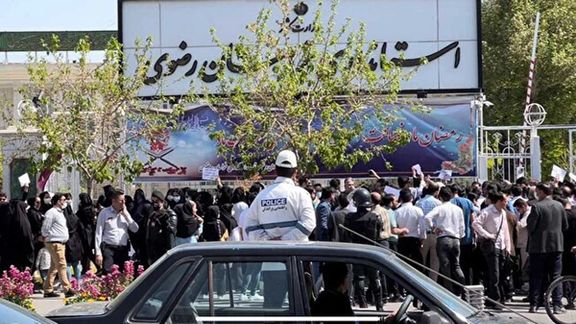
A group of nurses in Iran’s city of Qazvin gathered in front of the governor's office on Monday to protest inattention to their demands.

A group of nurses in Iran’s city of Qazvin gathered in front of the governor's office on Monday to protest inattention to their demands.
This protest rally was staged two days after a group of medical staff in the northeastern religious city of Mashhad also held a gathering to protest their poor living condition chanting, "We fought against Corona, we didn't get any support".
According to the Free Union of Iranian Workers the staff of Mashhad Medical Emergency also gathered in front of the Razavi Khorasan Governorate.
On the same day, Mashhad taxi drivers also protested outside the Taxi Organization, while news from the central city of Esfahan said farmers held a rally in front of the Water Department due to not receiving their water share.
On April 4, two hospitals in Babol in the north and central city of Arak witnessed a protest gathering of nurses who were angry about unpaid salaries.
Earlier, Secretary General of the Nursing Home announced in an interview with Didehban website that every month about 200 nurses emigrate from Iran.
Rising prices and economic hardship have led to repeated labor strikes and nationwide protests in the past few days.
The national currency has halved in value since September pushing prices for food and other necessities higher on top of 40-50-percent inflation in the past three years.
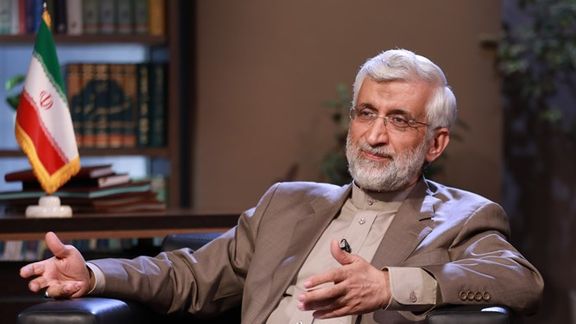
A website in Tehran says that former nuclear negotiator Saeed Jalili, and his brother who is programming chief at state TV plan to win control of the next parliament.
Khabar Online, wrote in an April 9 report that the Jalili brothers are determined to go from where they are in positions of power to the Iranian parliament (Majles) next year. Khabar Online added that all those who were in charge of the state television before were also political activists linked to major political groups.
The state television's current chief, Payman Jebelli appointed Vahid Jalili as his acting deputy during the first days after he got his mandate from Supreme Leader Ali Khamenei who supervises the organization and keeps an eye on the hiring and firing of key officials of the Islamic Republic of Iran Broadcasting (IRIB), which is the main tool for propagating his hardline ideas.
Saeed Jalili is a key figure in the ultra-conservative Paydari Party, which has a solid majority in the current parliament, but does not control the Speaker’s seat, which is occupied by Mohammad Bagher Ghalibaf (Qalibaf), a relative of Supreme Leader Ali Khamenei.
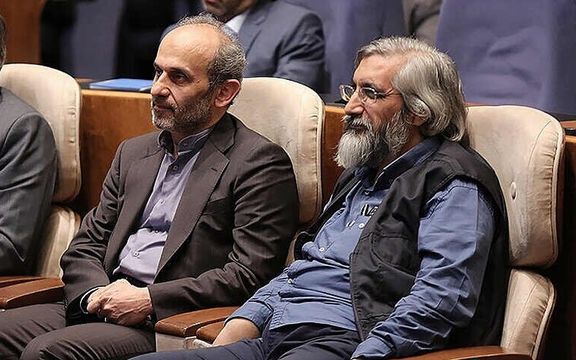
According to Khabar Online, it is not simply a matter of winning a majority in parliament, but Jalilis could be eying the Speaker's seat at the Majles, with the elder brother Saeed hoping to knock Ghalibaf out of the much-coveted seat.
Jalili, who had a dismal record as nuclear negotiator more than a decade ago, is squarely opposed to reviving the JCPOA nuclear deal with the West.
If they ever win the Majles, they would be determined to unseat nearly all of Iran's traditional conservatives from their positions of power and create some sort of monopoly for their likeminded ultraconservatives. In the process, it is clear that they would do their best to block any reformist or independent from getting elected.
Since several years before his appointment Vahid Jalili, better known as a vigilante group leader, tried to make his political views known by writing open letters to the heads of the IRIB and its political director Hossein Mohammadi, a confidant of Ayatollah Khamenei.
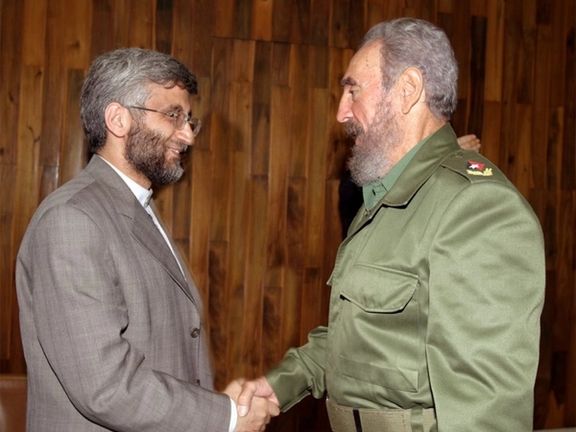
In those letters, the young Jalili often criticized the state media's behavior and suggested more hardline policies to govern media outlets, particularly TV channels.
Saeed Jalili, is thought to be steering the Raisi administration from the passenger seat, while avoiding the driver's seat and the responsibilities that comes with it, not only has planted his brother as the IRIB's acting deputy chief, his niece Alireza Khodabakhshi, is IRIB's point of person for everything relating to elections.
This gives Jalili a unique opportunity to determine who is to be groomed and promoted on the national TV and who is to be introduced to the nation as a black sheep through public opinion engineering and news manipulation.
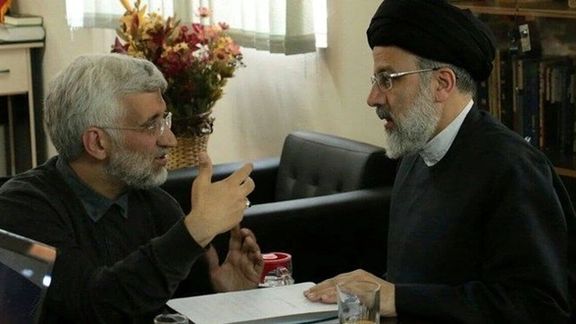
Thanks to Jalili's lack of expertise, the IRIB has lost a lot of its audience during the past two years as Jebelli has admitted in his recent interviews. However, this does not affect Jalilis and likeminded politicians' electability because the minority who watch IRIB's political preaching are the same minority that have taken part in extremely low-turnout elections in 2020 and 2021, which brought an inefficient parliament and notoriously incompetent President Ebrahim Raisi to power.
The majority of Iranians who are not represented among the hand-picked candidates are unlikely to take part in any election. Even the power-hungry reformists have said that they would not take part if their conditions, including due representation, are not met.
Saeed Jalili is rumored to be running his shadow government, which is now mainly based at the IRIB and is determined to use the platform to catapult himself, his brother, and their political allies to take full control of the parliament (Majles) next March.
Khabar Online, opined that the Jalilis' upper hand at the state TV violates the rights of other likely election candidates and further narrows the voters' choices. However, the nation has made its choice during the 2022 nationwide protests and that is: Going their own separate ways and defying the rules of the game as defined by Iran's hardliners.

While gassing continued in Iran’s schools Monday, Iranians want answers as to who is responsible.
Moineddin Saeedi, a member of the Iranian Parliament from Chabahar in Sistan and Baluchistan Province, criticized the police’s move to use traffic cameras to identify women removing hijab. He said, "If these cameras can detect crimes to such an extent, why are we currently facing the poisoning of girls?"
He added that the use of modern technological capabilities should be prioritized on issues such as delinquency, theft, pickpocketing, extortion and poisoning of female students.
Multiple girls’ schools in the capital Tehran, Karaj, Khoy and Orumiyeh (Urmia) in the West Azarbaijan province, and Sanandaj in Kordestan province were attacked by poisonous chemicals Monday, a week after the schools reopened following New Year holidays.
On Sunday, people in the Kurdish majority city of Saqqez -- the hometown of Mahsa Amini whose death in the hands of hijab enforcers ignited the current uprising – held a rally with security forces reportedly opening fire to disperse the protesters.
The demonstrations occurred after at least six girls’ schools in the city were attacked by the mysterious gas. On Monday, shop owners refused to open their businesses in protest against the regime’s inaction or possible involvement in the poisonings.
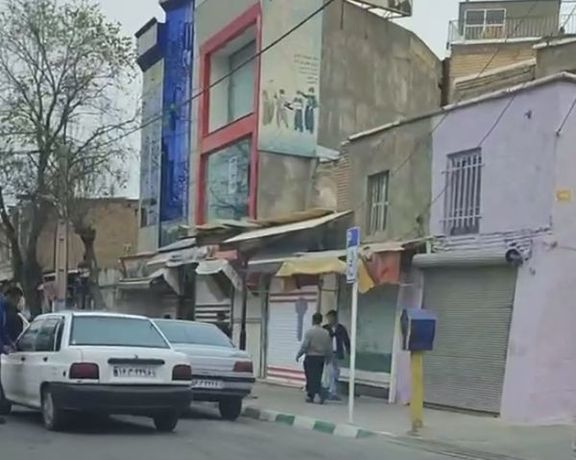
Since last week, scores of schoolgirls have been taken to hospital with symptoms of gas poisoning, such as difficulty in breathing, nausea, headache and muscle cramps.
Shocked by the news of the death of a Kurdish teenager, Karo Pashabadi, who died as a result of an attack on a Tehran school, innumerable social media users have started asking questions about the fate of those who are being hospitalized due to the phenomena.
Sixteen-year-old Karo, from the city of Kamyaran in Kordestan province, was laid to rest in Pashavah village about a month after inhaling poisonous gas in a chemical attack on a school in Tehran, where he was living.
At least one other child, 11-year-old Fatemeh Razaei, has died in the attacks which began on November 30 and have taken place in hundreds of schools nationwide.
Close to 300 schools were targeted in the past Iranian year ending on March 20 without any apparent effort by the government to seriously pursue the perpetrators or explain to terrified parents and students what was happening in so many schools. Thousands of students have been affected, mostly girls, with hundreds more hospitalized with symptoms including respiratory distress, numbness in their limbs, heart palpitations, headaches, nausea, and vomiting.
Ordinary Iranians have been suspicious of the involvement of the regime itself, or religious extremists protected by the regime, calling the attacks “state terrorism,” although the regime has denied responsibility and even staged arrests of suspects after widespread protests. Popular belief is that such large-scale and coordinated attacks cannot happen without the green light of the regime’s authorities.
Rasool Nafisi, a professor of sociology of development at Strayer University in Virginia, told Iran International on Sunday that the hardliners of the regime are the ones who benefit from the spread of such attacks as an intimidation tactic. "The government intends to use chemical attacks in the future to quash the uprising of the people, especially women and girls," he added.
Referring to a burglary case in which the CCTV cameras captured the faces of the thieves, Mahmoud Sadeghi, a reformist politician and former lawmaker, said in a tweet on Sunday that "It’s more than two years that they (police) have taken the complete video of the theft from the apartment, in which the faces of the thieves can be clearly identified from several angles. They have not yet provided any information about the burglars or the lost property. Now they want to use smart equipment to file legal cases for people in the streets and alleys.”
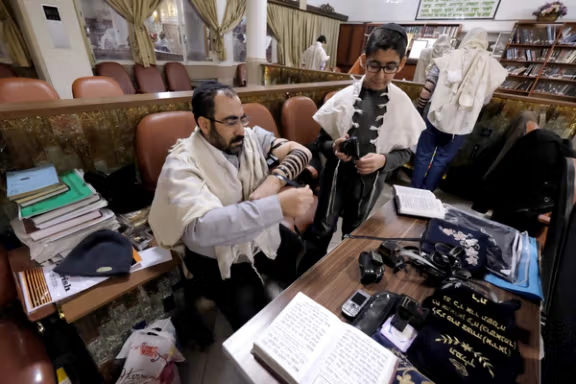
As part of restrictions against religious minorities in Iran, its Jewish community is being pressured to participate in Quds Day.
The reports in Israeli media say the community of roughly 10-15,000, once numbering in the hundreds of thousands, say pressure has been exerted to show support for Palestine, an annual phenomena.
The Jerusalem Post claims Iran’s Jewish leaders announced on Monday through its Telegram group: “Please do not go for picnics or enjoyable activities on al-Quds Day.”
However, the Jewish holiday of Passover coincides with Quds Day on Friday, and Beni Sabti, an Iranian born expert at the Jerusalem Institute for Strategy and Security, told The Jerusalem Post: “There is a silent pressure and everyone knows their role in this regime and the regime won’t hurt you” if you demonstrate in the al-Quds Day march.
The founder of the Islamic Republic of Iran, Ayatollah Khomeini named the last Friday of the month of Ramadan as Quds Day in 1979 to hold a demonstration against Israel.
In the early days of the uprising of the Iranians against the Islamic regime, the leaders of the Jewish community of Iran demanded that the members of this community not participate in the protests and in an unprecedented move, asked them not to come to the synagogues to participate in religious ceremonies for fear of retribution.
In December last year, Iran International reported in an exclusive report that the Islamic Republic has put pressure on religious minorities to force them to condemn the uprising of the Iranian people following the death in custody of Mahsa Amini.
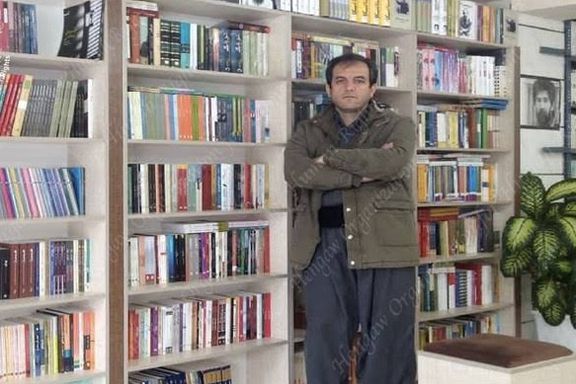
Amid the chemical attacks on schools in Iran, another teacher has been transferred to prison to serve a one-year sentence.
Omid Shah-Mohammadi, from the city of Divandarreh in Kordestan province and a member of Kordestan Teachers Association, was reportedly transferred to Bijar prison on Saturday.
The arrest of teachers and transferring them to jail in different cities has escalated after they protested to condemn chemical attack on schools and poisoning of female students, as well as the non-payment of salaries and arrears.
Omid Shah-Mohammadi was detained along with three other teachers on June 15, 2022, for participation in the teachers' association sit-in.
They were temporarily released after 76 days of detention in Sanandaj each on a bail of 15 billion rials (30,000 USD).
Shah Mohammadi was then sentenced to five years in prison by a Revolutionary Court in Sanandaj on charge of "action against national security"; however, his term was decreased to 16 months suspended imprisonment in the Court of Appeal of Kordestan province.
Meanwhile, three other teachers in the northern province of Gilan were summoned and arrested on Saturday and sent to Lakan prison in Rasht to serve a one-year term.
On Thursday, teachers in several cities held peaceful rallies and chanted their demands including the release of Mohammad Habibi, spokesperson of Iranian Teachers Trade Association as well as their long-held grievances over paygrades and low salaries.
Teachers have threatened to stage street protests in May if their demands are not met.
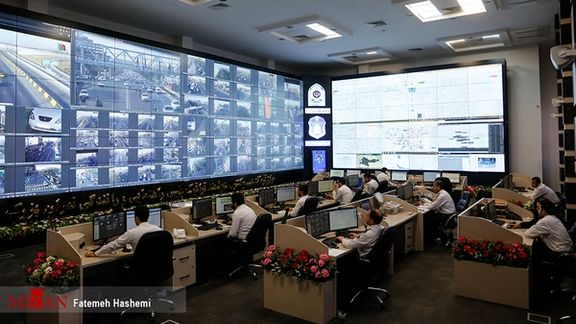
While countless Iranian women are appearing in public without hijab, the Islamic Republic is installing cameras around cities to rein in the growing act of civil disobedience.
The head of the traffic police of the capital, Tehran, said on Sunday that "cameras installed for recording traffic violations also record cases of women removing hijab.”
Second brigadier general Mohammad-Hossein Hamidi told Tasnim news agency, affiliated with the Revolutionary Guards, that "all the (surveillance) systems across the city have multi-purpose operations and store all kinds of information”.
He did not provide details about the data recorded by the cameras but said that although the surveillance cameras have been installed by the municipality, they have different data banks from which any government office or organization can extract information relevant to them.
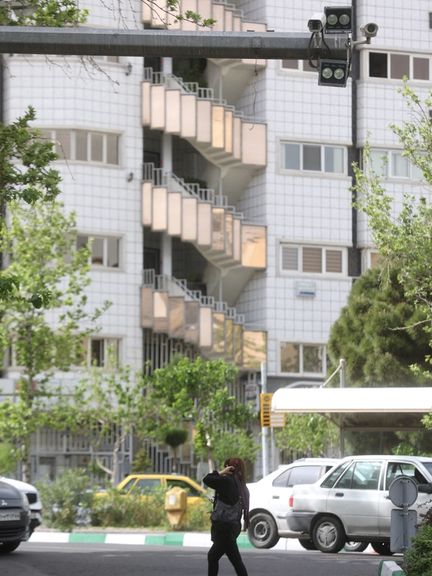
“The traffic police use the traffic data from these cameras, and other departments collect the information they need," he said, without elaborating to which institutions and organizations these departments belong.
However, last year, hacktivist group Black Reward found access to databanks of Fars News Agency, another media outlet affiliated with the IRGC. The hack revealed that the regime has begun collecting information about street protests from footage of CCTV cameras installed throughout the country.
Several lawmakers and hijab enforcement officials had talked about the use of cameras in public places and thoroughfares to identify and penalize unveiled women, but this is the first time a police commander has admitted that traffic cameras are recording other sorts of data on people.
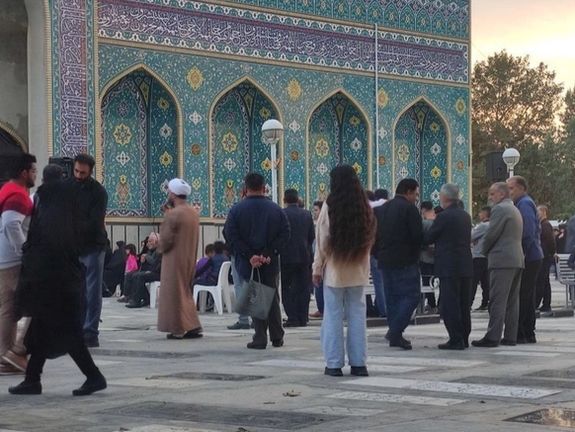
According to a Saturday statement by the police, the move is aimed at “preventing resistance against the hijab law,” adding that such resistance against the regime’s strict Islamic dress code tarnishes Iran's “spiritual image” and spreads insecurity.
Meanwhile, Ahmad-Reza Radan, the chief commander of Iran’s police forces, said that the forces under his command will use advanced technology and equipment to identify people who do not observe the mandatory hijab in public places as of next Saturday. Women and girls who do not wear scarves in "public places, cars or commercial centers" will be prosecuted, he added.
The uprising that was sparked by the death in police custody of 22-year-old Mahsa Amini has made it increasingly difficult to enforce the mandatory Islamic dress code. Appearing in public without a full veil has become a common sight even in small and more conservative towns. Since the beginning of the ‘Women, Life, Liberty’ movement in September last year, thousands of girls and women have set fire to their headscarves in a symbolic move and voiced opposition to compulsory hijab.
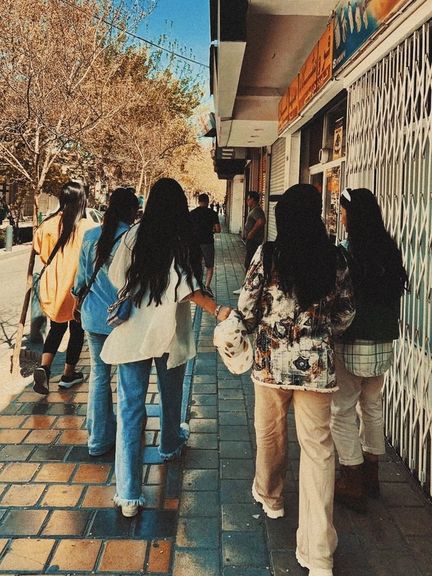
Earlier in April, Iran’s ruler Ali Khamenei threw his weight behind the hardliners who have been pushing for new measures to enforce the mandatory hijab laws, saying that “hijab is a restriction based on Sharia (Islamic law) and the constitution.” Khamenei’s assertion that flouting hijab is “religiously and politically haram” has emboldened officials for stricter measures. In a bid to deter the droves of women rebelling against hijab, the regime has also embarked on public humiliation tactics, such as placing officers in Tehran subway to prevent women without the hijab from entering.
It has not only emboldened officials but triggered a wave of civilian actions as the public takes the law into their own hands, seen last week when a mother and daughter were attacked with yogurt while out shopping.
The Islamic Republic, founded in 1979, is the only Muslim country other than Taliban ruled Afghanistan with such a strict interpretation of hijab and nationwide coercive measures for its observance, while Islam is the official religion in 26 countries in Asia, sub-Saharan Africa, North Africa, and the Middle East.
On Sunday, firebrand mouthpiece of the Supreme Leader, Hossein Shariatmadari, the editor of the flagship hardliner newspaper Kayhan, compared hijabless women to "drug addicts and drug dealers" who should be "seriously dealt with”.